- Home
- Joy Dettman
Yesterday's Dust Page 5
Yesterday's Dust Read online
Page 5
He and Johnny were working wonders over the river, and the old house, given a long overdue coat of paint, had come up well – on the outside. They could have been renting it out, should have been, as Bessy frequently told them. Someone living at the house might stop people helping themselves to the chooks and pigs. But Johnny didn’t want strangers wandering around the property, and what Johnny didn’t want, Ellie didn’t do. He slept at the old place when his moods were dark, or wandered there and kept Bessy’s dogs barking all night long.
She turned again to her sister, who was now staring unseeing at a geranium barely surviving in an old milk urn. Like Ellie, it had made the transition over the bridge six years ago and it wasn’t doing so well either. All stalks and no sap. Bessy stood, filled a watering can and poured water into the pot. ‘Buck up, love. You knew they were looking for his body. Christ, they dragged that river for weeks.’
‘Where did they find – ?’
‘This side of Daree. In that bit of bush that comes down to the road, about three miles east of Charlie and Vera Owen’s place. Only metres from the road, Jeff said.’
‘Just laying there, out in all the weather?’ Ellie was weeping now.
‘No. No, love. He’d been buried. A couple of – ’
‘Buried? Buried!’
‘Wouldn’t have been much left of him if he hadn’t of been buried! A couple of campers found him – or their dog did, when they were out walking. Around midday the day before yesterday. So Jeff was saying.’
‘Then it’s not him, Bessy. Who’d bury him?’
‘Charlie bloody Owen, for one. He knew about Jack and Vera. He swore to everyone in town that he’d bury him one day. And he done it, didn’t he?’
Ellie stared at the geranium, picked at a broken fingernail while Bessy leaned on a verandah post and blew smoke.
‘They’ve got to do the official ID, which Jeff says is only a formality. They’ve took photos or X-rays of his teeth, so they need to know the name of his dentist. Then it’s done and you get the money.’
‘His dentist?’
‘Dentists keep stuff for years. X-rays and the like, details of fillings and stuff. The cops always use dental records. You know that.’
Ellie nodded, nodded, her green eyes dripping.
‘Nothing much found on the body. A few bits of clothes.’ Bessy tossed her smoke into the garden but the wind blew it back to the verandah. Ellie flicked it away, watched sparks fly in the wind. ‘They think you might recognise his clothes, love.’
‘Are Benjie and Mickey back yet?’ It was Ben’s day off from the shop. He and Bessy’s son had taken a load of pigs up to the Warran sale.
‘The pig sale goes late. That’s why Jeff rung me, I suppose. Though I don’t know why he didn’t drive over and tell Johnny. It might have been better coming from him than me.’ Might not have either, she thought. He’d probably do a victory dance. ‘I came straight down here as soon as I heard.’
Almost straight down. She didn’t tell her sister about the book they’d been running at the pub since they’d found the gun. The odds on Jack being dead had fluctuated since. When the frogmen hadn’t found his body in the river, they went up, when the insurance investigator packed up and left town they went down. Then Mrs Carter swore she’d seen Jack at the Sydney racetrack, and the odds had gone up again.
The population of Mallawindy, like AMP, was now not wholly convinced that Jack hadn’t faked his disappearance, that he wasn’t hiding out in Sydney, biding his time until Ellie got the money. Bessy had given the Central a quick call before coming to find her sister, using her inside information to place a bet – and getting a lousy two to one on Jack being dead.
‘I told Jeff that I’d drive you down to Daree to talk to the Sydney blokes this afternoon, so we’d better get a move on.’
‘I can’t go to Daree. I’ve got that wedding tomorrow.’
‘They need the name of his dentist.’
‘Well I don’t know it, Bessy.’
‘Jeff said they’re homicide bigwigs, love,’ she said, watching her sister for reaction. There was none. ‘You don’t want them up here, do you, sniffing around, asking everybody bloody questions about him again? We only just got rid of the nosy bastards.’
‘I’m not going down to Daree today. I’ve got to wash my hair and you know it takes hours to dry. Ring them up, Bessy. Tell them Jack used to go to a dentist somewhere in Melbourne. I never knew where. If he had a toothache, he’d just take off and go. You know that.’
‘You paid his bills. You’ll find the dentist’s name on something. What about your old cheque butts?’
‘I never paid for his dentist. He must have paid, or May and Sam might have. He kept his private things in his briefcase, and I told you a dozen times that Annie took it with her that night. I haven’t got anything. Ben and Johnny burned most of the papers when they moved me over from the old place.’ Ellie looked towards the house across the river, looked at the trees, their branches tossed by the wind. ‘Ring Jeff and tell him that Annie might have something with the dentist’s name on it. There might have been some old bills in the briefcase – that’s if she’s still got it.’
‘She’s told you she hasn’t got it. I heard her tell you.’
‘She has so got it. I saw her take it. She took it that night before Jack came home. I saw her put it in her car boot.’
‘Yeah. Well, I’d keep her out of it if I were you. They annoyed Christ out of the poor kid when they found his gun. She’s got enough on her plate these days, I wouldn’t go mentioning his bloody briefcase to the cops or they’ll be into her again.’ She pulled a weed from the geranium pot, her fingers delving deep into the earth. She’d been looking forward to a trip to Daree, to getting the lowdown straight from the horse’s mouth.
‘Come on, love. Fix your hair and put a nice dress on and we’ll get it over and done with. It will only take us a couple of hours and I’ll dry your hair tonight with my hair dryer.’
‘You tangled it the last time you tried to do that. Anyway, I’ve got to get the eggs before the chooks start pecking at them, and I’m worried about the little brindle heifer. I wish you’d keep your bull locked in, Bessy. She was too young when he got to her,’ Ellie said as she walked off towards the river.
‘That bridge is dangerous in this wind. I’ll drive you around. And why don’t you wear the tracksuit I bought for your birthday?’
‘The pants are too tight when I bend over, and Benjie built that bridge for me. It’s safe if you’re careful.’
‘If you crawl on your belly! The bloody thing will be alive today.’
‘It’s solid as a rock.’
‘Rock being the operative word.’ Bessy walked behind her sister through the side gate. ‘I’m warning you. Those Sydney cops will be coming up here if you don’t go down and talk to them. It’ll be better for everyone if you keep it out of town.’
‘I can’t tell them anything that they don’t know already.’
‘You’d recognise his clothes, for Christ’s sake.’
‘So would you.’
‘Not his underdaks.’
‘Tell them . . . tell them he always wore Bonds briefs, size eighteen. And he never wore singlets. He wore black socks and black shoes, size nine. And he only ever bought Pelaco shirts because they have different sleeve lengths and he had long arms. And he was wearing sports trousers that night. Grey.’ Ellie walked ahead. Bessy attempted to keep up with her sister, who had extra inches and weight, who had longer legs and shorter years.
‘For Christ’s sake, wait up, will you?’
‘Don’t you come over the bridge, Bessy. You’ll get blown off. Go and ring up Jeff. Remind him that we’ve got Bronwyn’s wedding tomorrow, and tell him that the Sydney men will have to wait until . . .’
The rest of her words were lost to the wailing wind.
run, rabbit, run
Saturday 9 August
Panic came out of sleep, came for him out of the dark. It bi
t at his throat, constricting muscles that banded together until each one became that old familiar enemy. His throat cramped, drawing his mouth into a rictus smile. Scalp muscles gathered, squeezing his brain, chest muscles crushed his lungs. Each breath, hard fought for, was drawn in, pushed out. Fast panting breaths.
Coward. Weak little bastard.
Had to slow his breathing. He knew it. But rationality was dead. Couldn’t think his way outside of panic. Only those words left in the cerebral mass to haunt him, to chase him to hell and haunt him there. Words he could trace back to near birth. Repetition had pounded them deep.
Thunk. Thunk. Thunk. Thunk.
Weak little bastard.
When all else was dust Johnny Burton would still hear his father’s words. And run from them.
He ran now, that old inner running, that dream running, that leaden limb running. Couldn’t get away.
Run, Johnny. Get the little ones and run for the river.
Run, Johnny, run, Johnny, run, run, run.
Here comes Daddy with his old shotgun.
He’ll get by without his Johnny pie,
So run, Johnny, run, Johnny, run, run, run.
His limbs were swimming, shudder swimming in his bed, in his sweat. Hands dripping. Face, feet dripping while the damp sheet dragged, bunching, binding him, holding him down.
Fight me, you weak bastard.
Couldn’t fight any more. Just wanted it to end now, wanted his brain to lie down and die. Die and let him get some sleep.
Failure. That’s what he was and always had been. Failure. Weak little bastard. Running bastard.
He sucked on air, panting it in, and too fast out. His mouth was dry, his lips sandpaper, his tongue a lump of dry wood in his mouth, his eyes staring at a patch of not so dark, clinging to the patch of not so dark as the tremors shook his heavy frame.
Hold on to the lighter dark. Hold on to it and concentrate. Think white. Think light.
Look at the curtain, blowing, billowing with the breeze, like a white ghost in the dark. A white sail to carry you into the dawn. Ride it, and breathe over panic. Watch the curtain and breathe as it breathes. In and out. Slow now. Recognise it for what it is. A curtain, not the white sail of the old ferryman’s boat come to carry you across the river to Hell. A curtain. Ellie’s cheap nylon lace.
And outside that curtain the light was growing. Morning would come.
I shouldn’t have slept, he thought. He knew not to fall asleep with the light off, but his head had been aching. He hadn’t been able to force his eyes to read last night. That’s what he did each night, read anything, read until his eyes rebelled and the book fell from his hand while the light glowed on.
Light had always stilled panic when he awoke in the night. These last years he’d closed his door and left his light burning all night, sealing the light in with an old blanket placed against his door.
Ellie had bought him a torch when he was four or five years old and afraid of the dark. He’d slept with that torch beneath his pillow for weeks.
Don’t let Daddy see it or he’ll take it away, Johnny.
But Daddy saw it and he took it away, didn’t he?
Weak, cowardly little bastard.
He’d taken a box of matches from the kitchen then and he’d slept with them in his pyjama pocket until the matchbox fell apart, but he’d found another box. Slept with his matches for years – until Liza had come to fill the cot and Ben had come to share his room. Ben hadn’t been afraid of the dark. Ben had been there when he’d dreamed the bad dreams in the night. Ben with his funny little sighing snore. Soothing snore.
Ben in the room across the passage now. Ellie in her little room upstairs. Sleeping soundly.
And Jack Burton.
Dead.
He was dead.
Johnny Burton raised saliva enough to swallow. He was going to be okay. Morning was coming. Shadows were playing outside the curtain now. He could see the old oak tree, see its naked branches like grasping fingers.
Old eternal oak, the seed brought from Germany in a coat pocket. Always there, that tree, always outside that window.
A good climbing tree.
The shuddering had stilled, now wipe-out weariness came for him, wanting to drag him down again into sleep.
Insane agony, this weariness. Every bone, every muscle was begging for the release of sleep. Tired crept up from his feet to his legs, his back, his arms and higher. It crouched on his shoulders like a cat waiting, smiling, knowing its time would come to pounce, waiting to get him again in the dark, to curl over his face, suffocate him.
His eyes were stinging. He closed them, moistened them, and they wanted to remain closed. But he forced them to stare again at the curtain.
Intolerable, this weariness. When in his life had he been so intolerably tired?
He’d never been a good sleeper. Never game to sleep when he was a kid. Slept with one eye and both ears open.
Nothing to hear in this house. A silent old place. A safe old place. Close your eyes now and picture that old oak behind your eyes. It’s bigger now than it was back then. How long does an oak tree continue to grow? How long is forever?
Shadow fingers swaying, playing, his mind began to wander into the outland of sleep.
A good old climbing tree, that one. The best. He’d known good times in this little old house with Grandpa. Gentle old man with his wide bed an eight-year-old could crawl into when the bad dreams came. Grandpa’s house. Safe.
Good times with Grandpa and Mummy.
Be careful up that tree, Johnny. You’ll fall.
I’m careful, Mummy.
He’s a big boy, Ellie. Don’t breed fear into him. Boys were born to climb trees.
Big boy. Big enough to have a pocketknife. Grandpa said so. Cut Daddy’s head off with the pocketknife if he comes home and hurts Mummy again. Wait till he goes to sleep and just creep in and cut him and let all the blood out.
Cowardly, weak little bastard.
Our father, the destroyer, creator of crippling scars, hated be thy name. Thy time will come.
How many times had he planned his father’s death? The fingers on his left hand held high, he stared at them, grey fingers in the grey light. Slowly he added the fingers of his right hand. Not enough fingers. How many times had he planned to kill his father? How many leaves fall from an oak tree?
The scars of childhood had split open. Old memories and pain were swamping John Burton. Wide scars, they had never healed, only a fine membrane had grown over them, sealing in the putrescent pus that exploded at will, bursting forth to poison him with that old childhood infection.
He’d hated his father at four, despised him at eight. Just a little boy, not much bigger than Ann’s oldest boy now.
Man is only a frightened little boy, forced to grow tall, he thought.
Take the little ones away, Johnny. Do as I tell you. Get them away from me.
Mummy. She’s come alive.
Fight me, you weak little bastard. I could take you with one hand tied behind my back. Come on. Have a go. I’ll put my hand in my pocket. Have a go, you cowardly little mummy’s boy.
Light was creeping out of the east like grey water. He needed the dawn. He needed light in which to work. Light to dig holes. Light to fill holes. To hammer. Fix. Fill his mind with doing and leave no room for memories.
He’d make a start on the old bedrooms over the river. Strip the wallpaper in Ann’s old room and he’d get Ben to bring home some paint from the shop. White. Or something light. Pale blue, maybe. She’d loved blue.
Is the ocean water all blue if you put it in a cup, my Johnny? Is the stars still up on the sky when it is day time, my Johnny?
Questions. She’d never run out of questions. Talk? That one could have talked the leg off an iron pot.
Then nothing. She’d come home from Narrawee just a terrified little ghost of the one he’d waved away, her wide questioning eyes hidden behind a veil of fear.
John shook his head on
the pillow, forcing his mind to return to the old house and to the fading wallpaper, and to the rotting window that refused to open. It was too small anyway. That room had always been dark. Maybe he’d talk to Ben about putting new windows in the two back bedrooms. And the old kitchen – a couple of long windows in there would improve it. Easy enough to do, too; it had never been lined. Maybe he’d make a start on the kitchen. New windows. New cupboards. It was a good-sized room. You could get a modern kitchen in there and have a separate eating area.
Sleep tried to grab him while his mind had turned its back; the old kitchen became a dream and he didn’t know that it was a dream until it almost had its claws in. But he fought his way free of sleep and flung his legs from the tumbled bed, sitting a moment on its edge until his pulse rate steadied, then on bare feet he walked out the back to the bathroom, showering long, washing the dreams away.
He shaved, hating his face in the mirror, because it was his father’s face, hating the straight nose and the heavy hair, darker in the morning light. Hating the well-shaped brows, and the eyes, the high cheekbones and the determined jaw, loathing the mouth that could have been his father’s and the teeth. Straight. Strong.
Self-loathing.
He was taller than his father, a generous six foot three. Heavier bones, heavier wrists and shoulders, but hard work kept him slim. His hands and his feet were not his father’s. He looked at his hand holding the razor, then, turning his face from the mirror, blindly scraped the dreams and dark overnight growth away. His thick hair, tamed by a splash of cold water, looked black beneath the light. He parted it, combed it to the side. Jack Burton had never parted his hair. Slowly then he dressed in khaki drill trousers, a T-shirt and an old windcheater, clothing his father’s clone, disguising him, slowly rebuilding the working man his father had never been.
In the kitchen he boiled the jug, made coffee, strong, and he drank it while staring at the maddening clock, ticking too slow, the big hand jammed, like him, not wanting to move on.
He couldn’t move on because he had nowhere to go. No place left for him. Out of touch with God, he’d told them when he’d left the church. But had he ever been in touch with God? I’m going home to find my faith, he’d said, but he’d lied, he’d looked them in the eye and he’d lied. Easier to lie. Easier than the truth.

 The Hope Flower
The Hope Flower Trails in the Dust
Trails in the Dust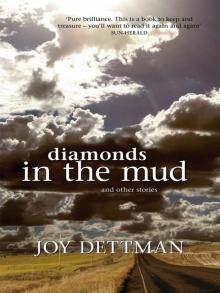 Diamonds in the Mud and Other Stories
Diamonds in the Mud and Other Stories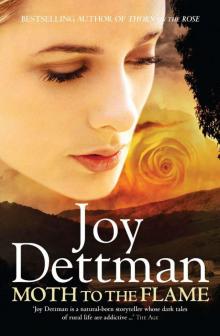 Moth to the Flame
Moth to the Flame The Tying of Threads
The Tying of Threads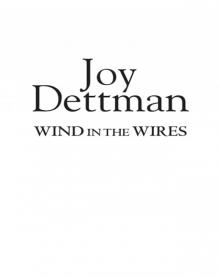 Wind in the Wires
Wind in the Wires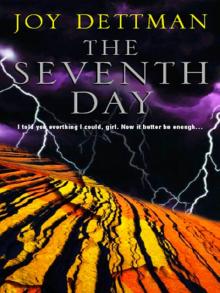 The Seventh Day
The Seventh Day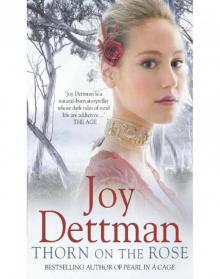 Thorn on the Rose
Thorn on the Rose Jacaranda Blue
Jacaranda Blue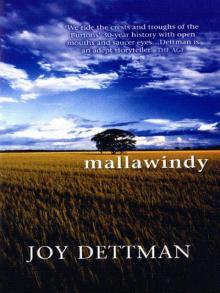 Mallawindy
Mallawindy Ripples on a Pond
Ripples on a Pond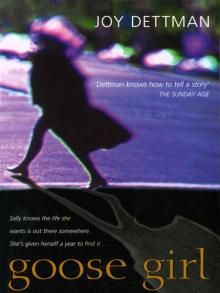 Goose Girl
Goose Girl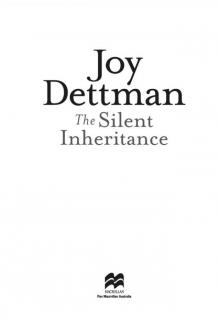 The Silent Inheritance
The Silent Inheritance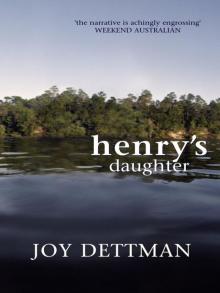 Henry’s Daughter
Henry’s Daughter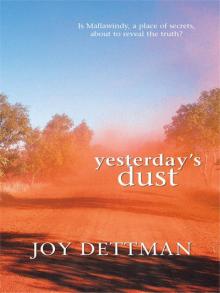 Yesterday's Dust
Yesterday's Dust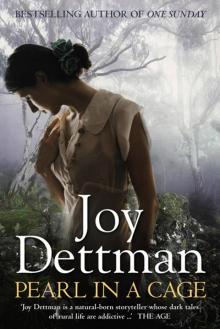 Pearl in a Cage
Pearl in a Cage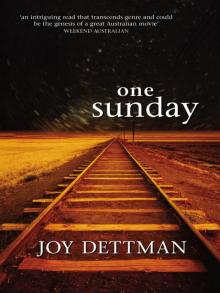 One Sunday
One Sunday